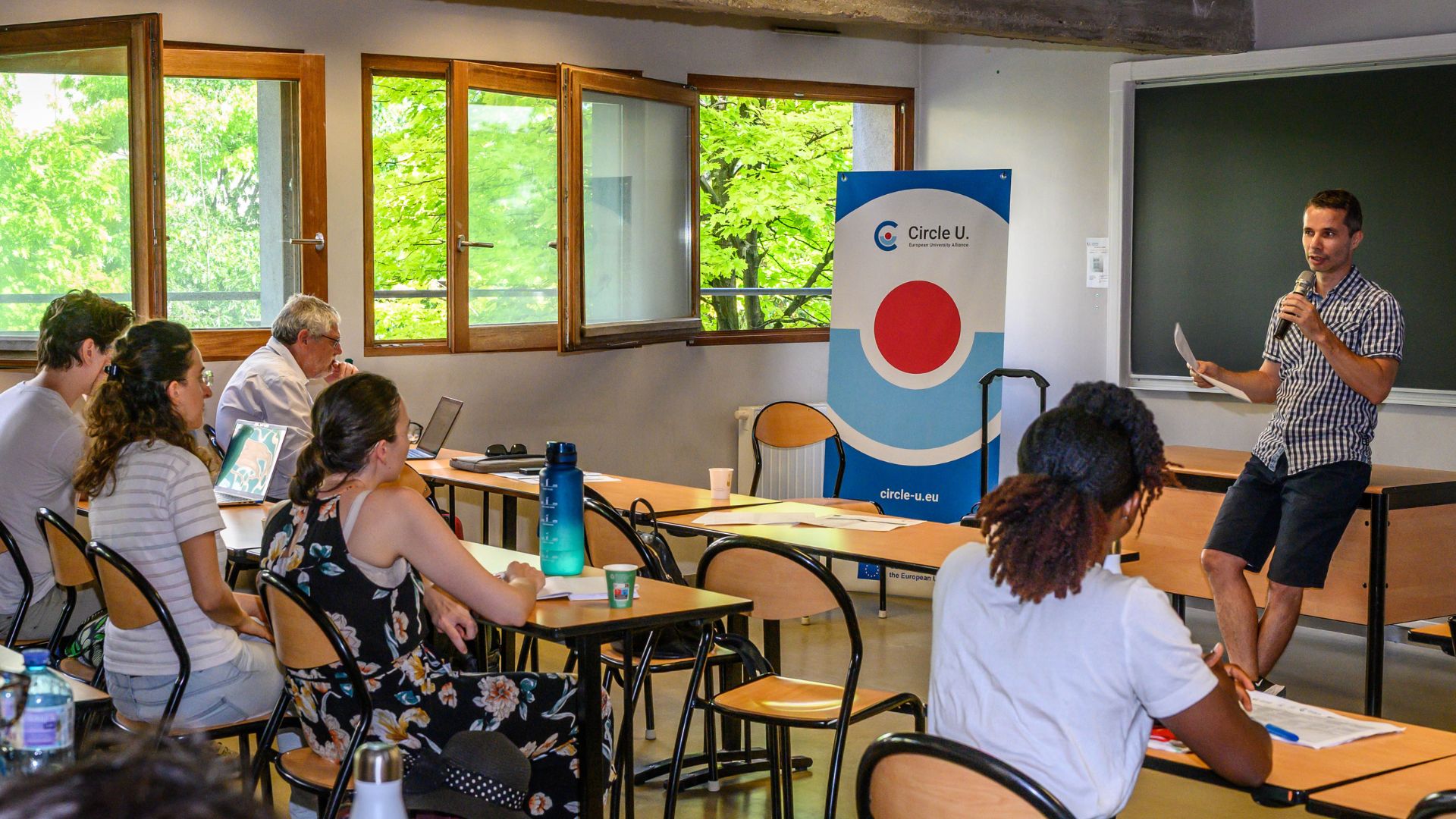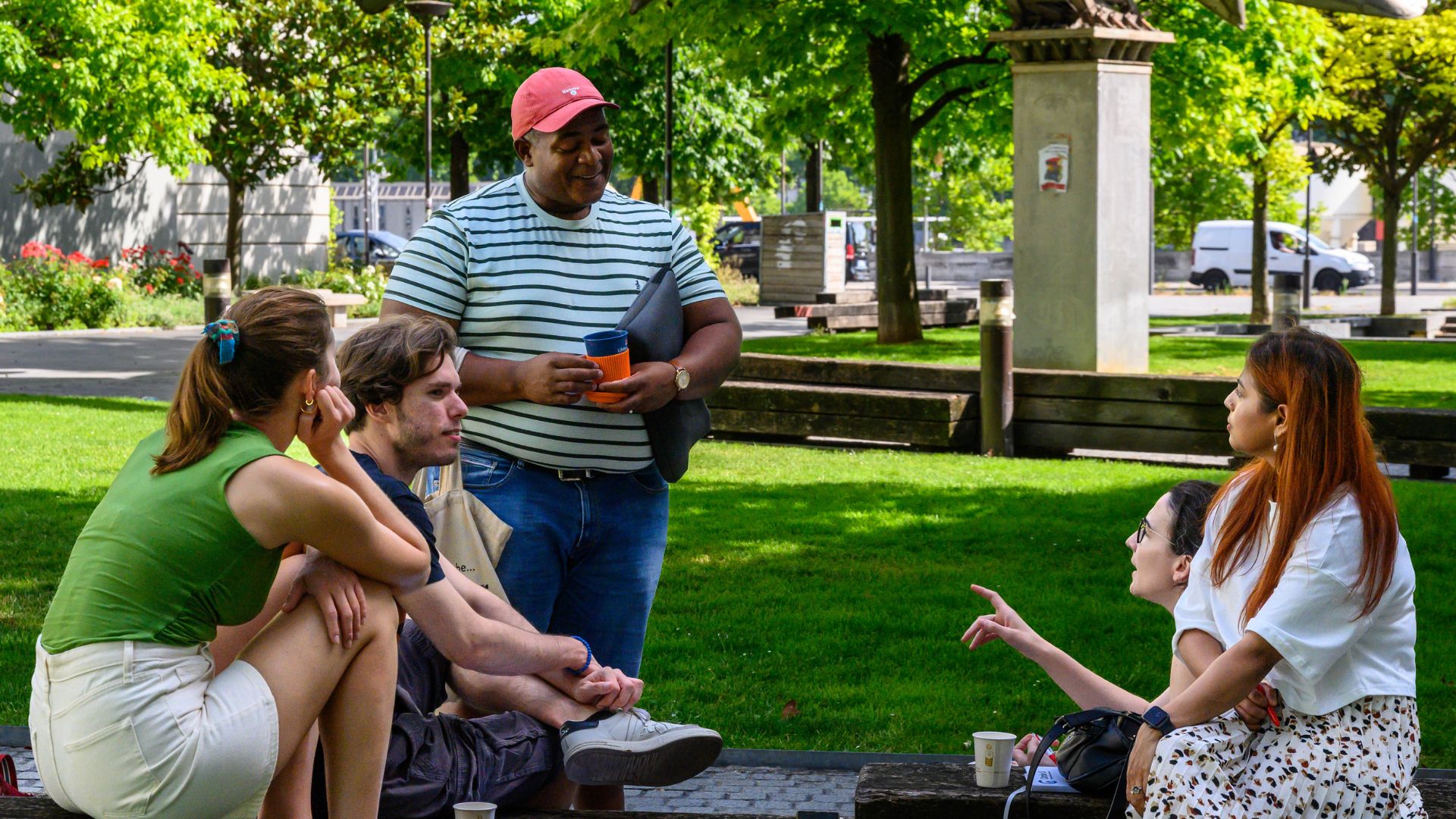ECTS
120 crédits
Niveau d'études visé
BAC +5 (niveau 7)
Durée
2 ans
Faculté
Faculté des Sciences
Langue des enseignements
Anglais
Présentation
The Health Engineering Master’s program (BME Paris) is designed to provide a two-year education in the field of bioengineering, at the intersection of biomedical sciences and engineering sciences. It results from a partnership between Université Paris Cité and Arts et Métiers .
The Master’s program is based on a distinctive partnership that fosters an interdisciplinary approach, encourages student initiatives and promotes a global perspective. This policy is supported by the top-level and complementary expertise and know-how of the two partners: engineering science in the engineering school within Arts et Métiers, on the one hand, and biomedical and health science at Université Paris Cité, on the other.
The teaching staff are primarily drawn from the partner institutions. Guest lecturers include hospital clinicians from APHP and researchers from other schools and academic institutions as well as from private companies (e.g. GE Healthcare, Philips Healthcare, Renault, Sanofi, Thalès, Materialise Medical, etc.).
Learning outcomes
The BME Paris Master offers an exemplary program of excellence designed for students from diverse backgrounds, including biology, chemistry, physics, mathematics, engineering, medicine, pharmacy, health sciences and computer sciences. The primary objectives of the Master’s program are:
- to provide students with the knowledge and tools required in a wide range of the biomedical engineering fields
- to foster a fruitful collaborative spirit between engineering and medical students, with the ultimate goal of bridging the existing « culture gap » between the corresponding professions.
While the second year (M2) offers five specialization tracks, the first year (M1) is devoted to strengthening and broadening students’ skills in specific engineering and biomedical subjects. Students receive guidance on their selection of teaching units, ensuring they are current with essential science subjects that might not have been covered in their prior studies. For example, engineering students may focus on physiology and anatomy, whereas biology or medical students may focus into signal processing and mechanics.
In M1 (semesters 1 and 2), there is one single track, with individualized choices of courses according to students’ backgrounds and their choice of specialization for M2.
The M2 (semesters 3 and 4) offers five tracks:
Objectifs
The track on Biotherapies and Advanced Therapy Medicinal Products (ATMPs) offers an exciting opportunity to dive deep into some of the most revolutionary fields in modern medicine. The program is designed to provide students with a comprehensive knowledge of the rapidly evolving areas of cell- and gene-based therapies, tissue engineering and regenerative medicine. Through a blend of lectures, hands-on laboratory work, and case studies, the program is structured to address key aspects of biotherapy development, including molecular and cellular/stem cell biology, immunology, and bioengineering techniques, providing participants with a solid grasp of the science behind advanced therapies.
Additionally, the program explores the regulatory frameworks and the clinical applicationsessential for the development and safe administration of these innovative therapies, preparing them for research and career opportunities in academia as well as in biopharmaceutical and biotechnology firms, specialized in these fast-growing therapies.
The MCB track thus serves as a comprehensive pathway into the expanding fields of cell and gene therapy, biopharmaceuticals, and regenerative medicine positioning students at the forefront of groundbreaking therapeutic innovations.
Le détail du programme de M1 et de M2 est accessible ici : https://www.bme-paris.com/program/master-2/molecular-cellular-biotherapies-mcb/
This curriculum is part of Université Paris Cité's Graduate School of BioMedical Engineering.
Compétences visées
- Respect scientific ethics
- Design and develop scientific projects
- Implement a project, define the objectives and context, carry out and evaluate the action
- Conduct and develop scientific and technical projects
- Analyze, diagnose and interpret the results of scientific experiments
- Know how to assess professional risks, implement specific evaluation methods
- Master specific methods and tools
Cross-curricular skills
- Work independently, manage time, self-evaluate.
- Use information and communication technologies.
- Conduct information research, identify access modes, analyze relevance, explain and transmit.
- Write clearly, prepare appropriate communication materials.
- Scientific communication in English.
- Working as a team: integrating, positioning, collaborating.
- Integrate into a professional environment: identify your skills and communicate them.
Programme
La formation se déroule en anglais, à temps plein.
Un stages de 2 à 4 mois obligatoires en Master 1 et un stage de 5 mois obligatoire en Master 2 dans un laboratoire de recherche académique, hospitalier ou industriel.
Sélectionnez un programme
Master 1 Ingénierie de la santé - Tronc commun à tous les parcours
Scientific thinking module
6 crédits57hScientific communication
0 crédits21hMedicine and science
3 crédits12hCulture and languages
0 crédits12hIntroduction to Digital Health
3 crédits12h
Biomedical engineering and design
3 crédits24hAu choix : 7 parmi 17
Molecular and cellular biology for engineers
3 crédits24hMolecular, cellular and tissue biology
3 crédits24hAnatomy and physiology for engineers
3 crédits24hA mathematical introduction to data analysis
3 crédits24hApplied Mathematics for biological systems
3 crédits24hBiomedical modeling 1
3 crédits24hBiomedical modeling 2
3 crédits24hComputer programming 1
3 crédits24hComputer programming 2
3 crédits24hIntroduction to Data Science
3 crédits24hHealth Data Science
3 crédits24hIn Vitro Models and Alternatives to Animal Testing
3 crédits21hIntroduction to omics
3 crédits22hPhysics for biomedical monitoring and imaging
3 crédits22hAdvanced Machine Learning for Healthcare
3 crédits24hMultibody System Dynamics
3 crédits24hContinuum Mechanics for Biological Tissues
3 crédits24h
Facultatif
UE transverses UP Cité : Engagement étudiant
3 créditsUE transverses UP Cité : Sport
3 créditsUE libre 1
3 créditsUE libre 2
6 crédits
Obligatoire
3 crédits24hScientific writing & project management
3 crédits24h
Optionnel
27 créditsAu choix : 2 à 5 parmi 11
Innovation & entrepreneurship
3 crédits24hDigital Health hackathon
3 crédits24hBioFabLab project
12 crédits100hBioFabLab project in DigiHealth
12 crédits100hInternship
12 crédits100hLong internship
24 crédits200hClinical immersion in digital health
6 crédits48hImmersion in a digital health start-up
6 crédits48hUE libre 3
3 créditsUE libre 4
6 créditsUE libre 5
12 crédits
Master 2 Ingénierie de la santé - Parcours : Biothérapies moléculaires et cellulaires / Molecular and Cellular Biotherapies (MCB)
Interdisciplinary Seminar
3 crédits16hResearch methodology
3 crédits24hGene transfert strategies
3 crédits26hBasic immulogy in biotherapies
3 crédits32hStem cells and disease modelling
3 crédits34hGene and cell therapy
9 crédits74hCancer therapies
3 crédits28hTissue engineering
3 crédits34hFacultatif
UE Ouverture
3 créditsUE Libre
3 crédits
Ethical, Industrial and Environmental aspects in biomedical enginnering
3 crédits36hBioinformartics
3 crédits24hInternship
24 crédits200hFacultatif
UE Ouverture
3 créditsUE Libre
3 crédits
Stages et projets tutorés
OUI
Contrôle des connaissances
Les modalités de contrôle des connaissances (MCC) reposent sur des schémas classiques d’évaluation pour les UEs : examen terminal écrit ou oral, contrôle continu ou mixte. Certaines UEs incluent à la fois des examens oraux et écrits.
Pour connaitre le détail des modalités de contrôle des connaissances et compétences, nous vous invitons à prendre contact avec l’UFR (voir le lien en savoir+)
Aménagements particuliers
Admission
Public cible
Etudiants français et étrangers titulaires d’une licence ou d’un Master scientifique, étudiants en médecine ou en pharmacie, élève ingénieurs.
Conditions d'admission
Conditions to apply for the 1st year of our master’s program (M1)
- having obtained or being in the process of validating a Licence 3 or a Bachelor’s degree in science (particularly, but not restricted to, life and health sciences, engineering, chemistry, physics, mechanics, mathematics, computer science).
- being a physiotherapist or a 4th year student in a physiotherapist school
Conditions to apply directly for the 2nd year of our master’s program (M2)
- For students in science or engineering:
- having obtained or being in the process of validating a Master 1
- having obtained or being in the process of validating a Master’s degree
- being a 3rd year student in an engineering school or
- being a 2nd year student in an engineering school (particularly Arts et Métiers ParisTech, Mines Paris Tech, Chimie ParisTech and ESPCI Paris) affiliated with the Master BME Paris program for a double diploma
- being a 2nd year student at ENS Paris
- For students in health science (medical, pharmacy or dental schools):
- being a 3rd year student in the Medicine-Science or Pharmacy-Science program at University Paris Cité or at l’Ecole de l’Inserm Liliane Bettencourt
- being an intern or Doctor of Medicine (MD), Pharmacy (Pharm.D), Dental Surgery (DDS) or Dental Medicine (DMD)
- For physiotherapists or 4th year students in physiotherapist schools: you can apply directly for the M2 only if you are able to prove that you attended an additional research oriented curriculum (formation complémentaire à et pour la recherche)
Pré-requis
C1 level in English (TOEIC, TOEFL, …).
Modalités de candidature
Online application and interview for preselected candidates.
Information and link to apply: http://bme.biomedicale.parisdescartes.fr/apply/
In preparing your application, please include the followings:
All higher education grade transcripts and diplomas (with French or English translations, if originals are in another language), two recommendation letters (in French or in English), resume and motivation letter (both in English), and proof of at least a C1 level in English (TOEIC, TOEFL, …).
Droits de scolarité
Les droits d'inscription nationaux sont annuels et fixés par le ministère de l'Enseignement supérieur de la Recherche. S’y ajoutent les contributions obligatoires et facultatives selon la situation individuelle de l’étudiant.
Des frais de formation supplémentaires peuvent s’appliquer au public de formation professionnelle. Plus d’informations ici.
Liens utiles
Et après ?
Poursuites d'études
Opportunities
- PhD in a field related to the M2 track followed by the student, in academia or jointly with a company (CIFRE PhDs).
- R&D positions in large companies or startups, in almost all activity biomedical and biotech sectors.
- Continuing medical or pharmacy school, or accessing it (« passerelle »), in either 2nd or 3rd year.
Business programs in biotech management (ESCP, EM Lyon / Centrale Supelec…)
Passerelle
Passerelle vers médecine, pharmacie ou odontologie
Insertion professionnelle
Taux insertion professionnelle 100%
*Enquête du MESRI sur les diplômés 2019, 30 mois après obtention du diplôme.
|
Effectif des diplômés |
Effectif des répondants |
Taux de réponse |
Part des diplômés en formation initiale |
Part des diplômés en formation apprentissage |
Part des diplômés en formation continue |
|
17 |
9 |
53% |
100% |
- |
- |
|
Part des cadres et des professions intermédiaires |
Part des emplois stables |
Part des emplois à plein temps |
Part des emplois en adéquation avec le niveau d'études |
Part des emplois en adéquation avec la formation suivie |
|
100% |
29% |
86% |
- |
100% |
Référentiel
Référentiel RNCP
39433
International
Mobilité internationale
Mobilité entrante importante. La part des étudiants internationaux représente 60% des effectifs en M1 et 30% de ceux de M2.
Mobilité sortante pour le stage de M1 ou de M2.
Convention avec l’université d’Hangzhou Dianzi (Chine) : formation délocalisée au niveau M1.
Contacts
Dernière mise à jour le 23 juin 2025
A lire aussi
À l’occasion de la Semaine nationale des Cordées de la réussite 2026, l’Université Paris Cité réaffirme son engagement en faveur de la démocratisation de l’accès à l’enseignement supérieur à travers des actions concrètes, innovantes et ancrées dans les territoires.
Étudiantes et étudiants de l’Université Paris Cité, nous vous donnons rendez-vous le jeudi 19 mars 2026 pour la 2ᵉ édition de cet événement annuel dédié à l’emploi, aux stages et à l’alternance. Près de 30 recruteurs seront présents pour vous proposer des opportunités concrètes et des conseils personnalisés afin de faciliter votre insertion professionnelle. Nouveauté cette année : le Forum des métiers de la transition écologique et de la solidarité vous invitera à réfléchir aux enjeux de l’engagement écologique et solidaire dans le monde du travail au travers de conférence, ateliers et tables rondes.
Vous étudiez à l’Université Paris Cité et vous souhaitez profiter de vos vacances d’été pour renforcer votre CV tout en découvrant un nouveau pays ? Notre université est membre de l’alliance européenne Circle U. et vous permet, à travers son campus ouvert, de candidater gratuitement aux écoles d’été organisées chaque année. Plusieurs thématiques transverses sont abordées comme la Santé Globale, le Climat, la Démocratie ou le Multilinguisme par exemple. Les candidatures sont ouvertes jusqu’au 28 février, renseignez-vous !
Vous êtes doctorant ou doctorante à l’Université Paris Cité et vous souhaitez étendre votre réseau et vos connaissances en Santé Globale ? L’alliance européenne Circle U. vous invite à participer à la nouvelle édition de son école d’été « New avenues for Global Health » qui aura lieu du 6 au 11 juillet 2026 dans les locaux de notre université ! Les candidatures sont acceptées jusqu’au 28 février.







